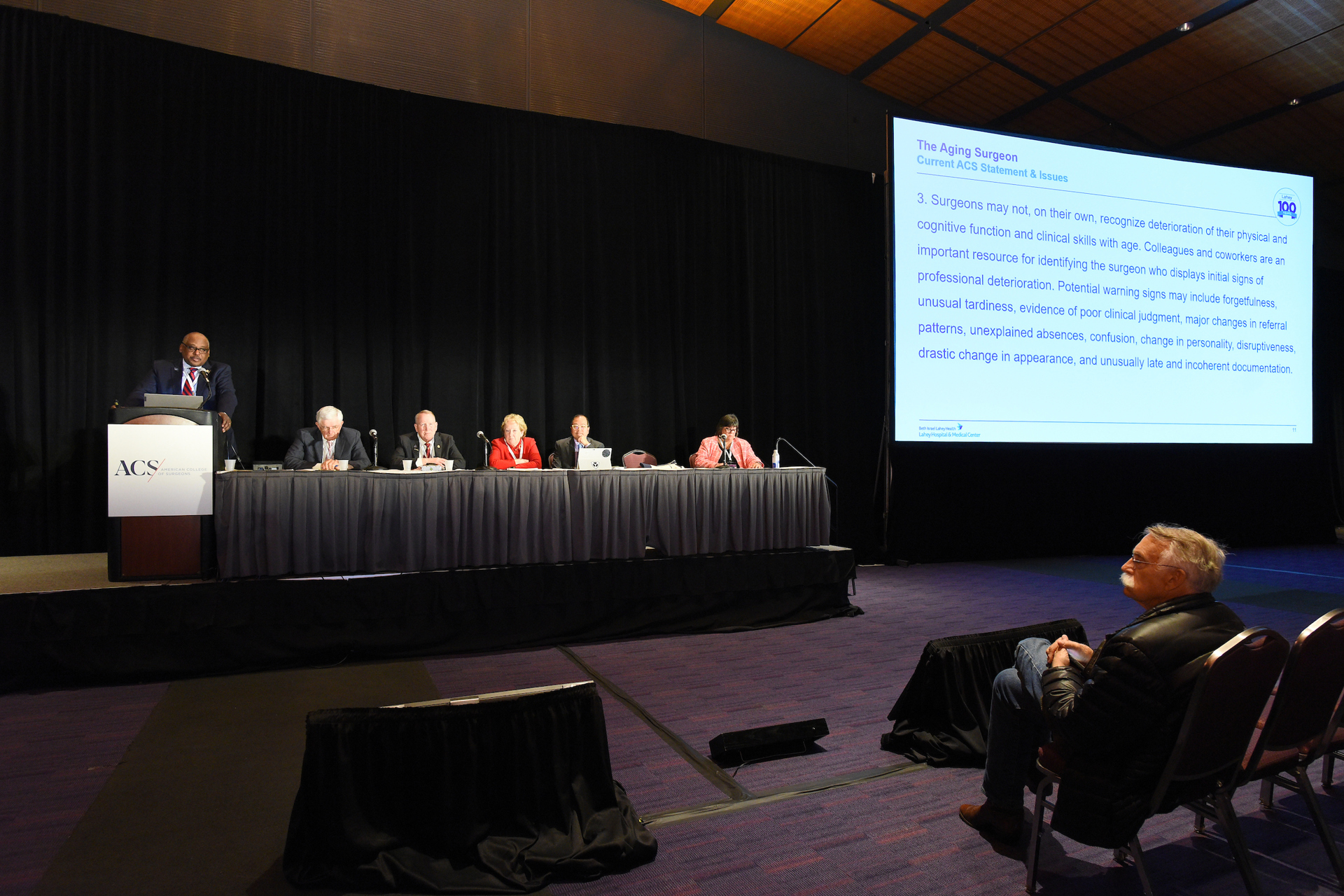In the Clinical Congress 2023 session Senior Surgeon Practice Transition: Is It Voluntary?, panelists explored pathways for assessing the performance of senior surgeons as they consider options for a potential career adjustment.
“The ACS represents all stages of a surgeon’s professional life, and the last stage in that transition from active practice to when you are beginning to wind down is one that we don’t look forward to—but I think it is an opportunity for the College to bring some ideas forward that we can anchor ourselves in as we enter that stage of our career,” said co-moderator E. Christopher Ellison, MD, FACS, ACS Immediate Past-President.
Steven C. Stain, MD, FACS, an ACS Regent and chair of the Department of Surgery at Lahey Hospital & Medical Center in Burlington, Massachusetts, described the current ACS Statement on the Aging Surgeon, which was approved by the Board of Regents in 2015. The statement outlines nine guidelines intended to address concerns related to advanced age, competency, and occupational performance, including recommendations on lifestyle and wellness and the opportunity for colleagues to freely express concerns about a surgeon’s performance.
“The College statement also recommends voluntary and confidential baseline physical examination and visual testing for overall health assessment between [the ages] of 65 and 70,” Dr. Stain said, noting that that the guidelines also suggest that “the decision [regarding privileges] should be made at the medical staff and/or hospital level, rather than a nationwide-level ban.”
After introducing the ACS’s early efforts to address the needs of the aging the surgeon, Dr. Stain outlined current strategies concentrated on this complex topic, including a white paper, presently under review and tentatively titled, “Sustaining the Lifelong Competency of Surgeons: A Multimodality Empowerment Personal and Institutional Strategy.”
Citing a proposed recommendation from the white paper, Dr. Stain said that “a mandatory retirement age may have a deleterious impact on access to experienced surgical care, particularly in rural and underserved areas. Objective assessment of fitness should supplant consideration of a mandatory retirement age.”
Mandatory cognitive and psychomotor testing is another proposed recommendation, specifically for some senior surgeons who are “unwilling to relinquish their operative duties when indicated.”
Celeste Hollands, MD, FACS, associate professor of pediatric surgery at Texas Tech University Health Sciences Center in Lubbock, underscored the reality that the onset of cognitive or physical decline is variable. “It does not turn off at a predominated age—we fail gradually,” she said, adding that surgeons can reach their overall peak performance at approximately 40 to 45 years of age.
Dr. Hollands summarized current assessment tools, including the Objective Structured Assessment of Technical Skills (OSATS) test, surgical audits, peer reviews, and performance reviews. “A good assessment must capture variation in performance, be feasible, safe, and reliable,” she said. “Let’s acknowledge that the only validated assessment tool is the OSATS. The other tools are used retrospectively and could be used punitively. We need assessments that help us anticipate a problem before it happens.”
Roy Phitayakorn, MD, MHPE, FACS, associate professor of surgery at Harvard Medical School in Boston, Massachusetts, described factors affecting retirement decision-making for surgeons. He cited a 2021 survey of ACS members aged 60 years and older that revealed most surgeons did not retire at their target age.
In fact, 38% retired later than planned, while 25% retired earlier. The top contributing factors that influence when a surgeon may retire included practice environment (50%), finances (34%), and the desire to pursue other activities (20%).
“Retirement planning should likely start 5-10 years in advance,” advised Dr. Phitayakorn, calling for enhanced resources such as mentorship opportunities to help surgeons develop their individualized retirement plans.
“Get ready—no matter how brilliant you are, know that you will have some decline and [will have to figure out] how you will manage that,” said Julie A. Freischlag, MD, FACS, DFSVS, ACS Past-President, who closed the session. She suggested that senior surgeons seek out alternate roles when applicable, including mentoring and teaching, research, and administrative roles.
This session is available for on-demand viewing on the virtual meeting platform.

